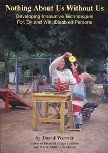CHAPTER 52
Love, Sex, and Social Adjustment
In the village of Ajoya, the home of Project PROJIMO, disabled young men and women happily go to dances and outdoor movies together. They are not ashamed to let people know that they have a close or loving relationship. Some of the disabled young persons who have grown to know and care for each other through the Project have married and now have children.
All this is fairly much accepted as natural and normal and 'right' by most of the local villagers.
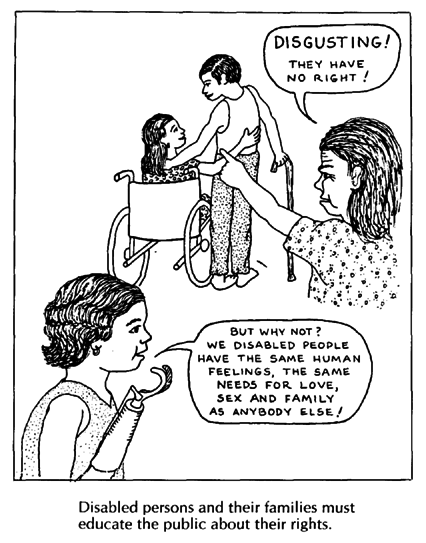
But things were not always this way. A few years ago, when PROJIMO had just begun, many people believed that a severely or even moderately disabled person should not and could not have a loving relationship, get married, or have children.
I remember one evening in the spring, a few years ago. An old woman watched a group of young couples listening to guitar players at the village square. One young man, who had a clubbed foot and used a cane, stood close to a young woman in a wheelchair. When the musicians started playing a romantic song, the disabled couple gently put their arms around each other. The old woman was shocked. Angrily she pointed to the pair and cried, "Isn't that disgusting! People like that have no right to behave like that! It's not natural! They're cripples!''
When PROJIMO first began, unfortunately the villagers were not the only ones who thought that disabled persons should and could not get married or have loving relationships. Many disabled young people half-believed it themselves, and in their personal lives were often depressed, frustrated, or confused. While society told them one thing, their hearts and their bodies told them another. Most believed they could never be attractive to a member of the opposite sex. Yet through adolescence, they felt increasingly attracted. Many had serious doubts about their own sexual ability. Some had discovered that they did, in fact, have fully developed feeling and functions. But they had no acceptable way to express them.
Some visiting advisers to PROJIMO were older disabled persons who had learned to understand their own feelings, had married, or had formed loving relationships. Slowly the disabled young people at PROJIMO began to accept their own desires, needs, and dreams. More important, they began to discover they were not so alone, not as different from other people, as they had thought. Above all, they discovered that they were attractive to other persons. Soon the romances began.
At first things sometimes got out of hand. The bottled-up feelings of the young people came flooding out. There were occasional mistakes and abuses. When the disabled group discovered that the rules society had set for them were unfair, often their first response was to break the rules recklessly. But then, faced by the sometimes cruel results of their own hurry, passion, and inexperience, they discovered the need for a few precautions and guidelines determined by the group. They had been hurt often enough themselves not to want to cause additional hurt. And so, little by little, the PROJIMO team members have discovered their ability to live fuller lives and have more complete relationships than they had previously believed possible. Also, little by little, the local community has begun to accept this. For the first time, romances have begun to develop openly between non-disabled and disabled villagers. A new level of awareness and acceptance is slowly being achieved.
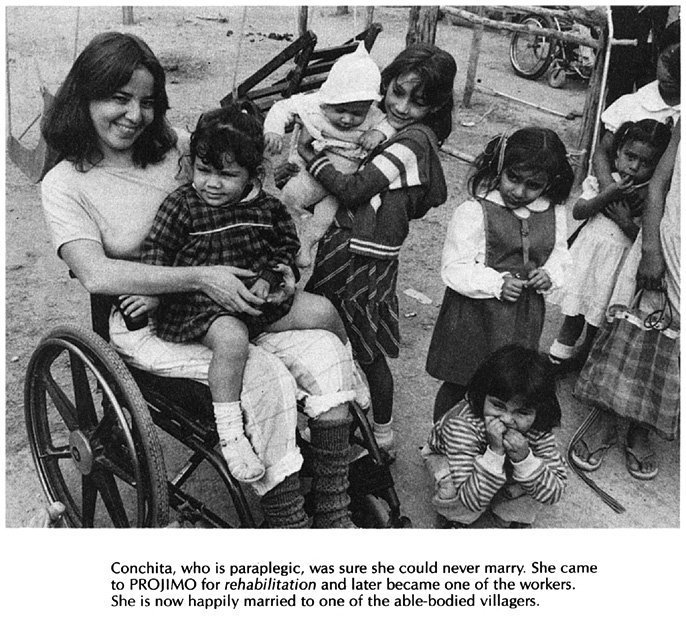
The personal and sexual needs of young persons
Every child, whether disabled or not, has the same basic needs for food, protection, and love, The child who is treated consistently with love, respect, and understanding has a greater chance of becoming a loving, respectful, and understanding adult.
Every child has a need to be touched and held. Small children learn about themselves by exploring and touching different parts of their bodies. A child whose disability makes touching and exploring her body more difficult may have an even greater need than other children to be held and hugged.
Most societies have rules and taboos that attempt to limit and govern sexual behavior. And within most societies, young people (and old) usually find ways of getting around some of those rules, usually more or less secretly.
The best answer to sex education may be to look for informal and unsupervised ways for disabled adolescents to spend time with and share the secrets of other adolescents.
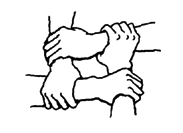
LOVING RELATIONSHIPS, MARRIAGE, AND FORMING A FAMILY
It is important that disabled persons and everyone else in the community realize that most disabled persons are capable of getting married and having children. Except for a few inherited disabilities, the children born to disabled parents have just as great a chance of being normal as do children of non-disabled parents.
For most disabled persons, a close, loving partnership is possible. This is true even when the disability makes having children unlikely, as in some men with spinal cord injury. Persons who have no feeling in their sex parts can discover sexual satisfaction through meeting of lips or other parts of the body that feel. If the couple want children, perhaps they can adopt them.
In some societies, nearly everyone is expected and able to marry, including disabled persons. But in cultures that put great importance on an 'ideal 'or complete physical appearance, it may be difficult for the disabled person to find a partner. The biggest barrier is sometimes the feeling by the disabled person that he or she can never be attractive to anyone. To overcome those feelings, disabled persons can sometimes advise one another. Those who have overcome their own fears of unacceptability and have formed loving relationships can do much to help others realize that inner beauty and gentleness of spirit can also make a person attractive.
Often it takes someone with a disability to see beyond the outside of another disabled person to the unique qualities inside. So it often happens that disabled persons take other disabled persons as partners - although their disabilities may be quite different. However, as disabled persons gain greater acceptance and participation in the community, loving relationships and marriage between non-disabled and disabled persons become more common.
Often there are not many chances for disabled young persons to get to know and become close to other young persons. Therefore, such opportunities can and should be sought or arranged. The types of opportunities and how they can be arranged will of course differ from one community to another.
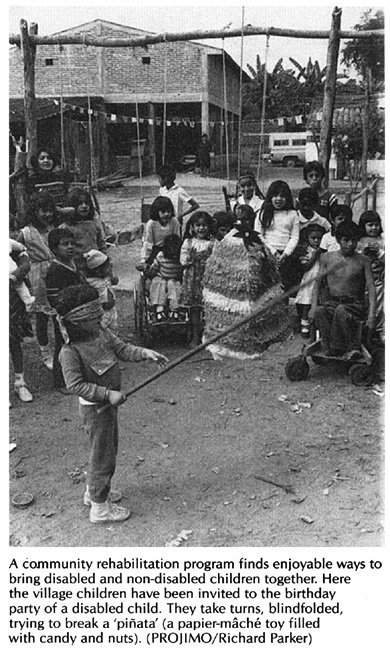
Chances should be provided for disabled young people, even in wheelchairs, to go to ceremonies, dances, and public events that other young people attend. A community rehabilitation program can arrange games, parties, and other activities to which both disabled and non-disabled young people are invited, and in which they can participate equally.
The need for full integration
It must be remembered that opportunities for a close, loving relationship are only one aspect of leading a full, accepted and participating life in the community. The more that can be done to bring about greater integration and participation of disabled persons in the life of the community, the more everyone will learn to look beyond a disability and see the person. When this happens, it opens up many new possibilities.
Birth control
Disabled girls and boys should be given the same information and opportunities to avoid unwanted pregnancy as non-disabled young people. Making such information and methods available may be of special importance for participants in a self-run community rehabilitation program. (For different methods of birth control, see Where There Is No Doctor, Chapter 20.)
The mentally retarded child and sex
Mentally retarded children, like others, as they grow up take increased interest in sex. In fact, they may take more interest in bodily experiences because opportunities for other activities are more limited.
Because the complex messages that the retarded child gets from other people are often confusing or contradictory, the child may develop unacceptable patterns of behavior. Often parents do not know how to handle this. For example, a mother may be afraid to take her retarded boy with her to the market because he tries to touch every girl he sees.
It is important that retarded children are helped to understand clearly what behavior is acceptable and what is not, and where. To accomplish this, a behavior approach to learning can be used. The family can consistently reward good behavior and carefully avoid giving the child special attention or in any way rewarding bad behavior. This approach is discussed in Chapter 40. In children with behavior difficulties, if possible, the family should start using a behavior approach to learning long before the child grows up sexually. The younger the better.
A common mistake is to pretend that retarded young people do not have a need for loving personal relationships. The need exists, and if unanswered, can lead to difficulties both for themselves and for others.
In most communities, it is very difficult for the retarded person to have a close, loving relationship. In some countries, programs arrange for retarded persons to live together in special homes or to come together for social activities. As a result, some of them form couples, and sometimes marry.
Trying to protect retarded girls against sexual abuse, and undesirable pregnancy, and at the same time respect the girls' rights, can be difficult. Some programs try to solve the problem through sex education, or by providing retarded young women with birth control methods to prevent pregnancy. Check with your local health worker to see what birth control methods are available and acceptable in your area.

Marriage and family
In countries where the disabled have achieved greater acceptance and involvement in the community, an increasing number of disabled persons, including some with fairly severe disabilities, are getting married and having families of their own.
The ability of a married disabled person to bring up a family depends a lot on economics. Thus, an effort to help young disabled persons learn the skills necessary to work and earn a living or maintain a home is an important part of the preparation for marriage and family.
Sex education
On the average, disabled children begin to mature sexually around the same age as non- disabled children. Girls may begin to have monthly bleeding(menstruate) at about age 11 or 12(or earlier or later). Boys begin to release semen at age 12, 13, or 14(sometimes earlier or later). Often these new bodily functions take the child by surprise, and may fill the child with confusion or even guilt unless he or she is informed about their naturalness and purpose.
Because disabled children often do not have the same opportunity to mix with other children in an unsupervised way, they can miss out on one of the most common forms of sex education: children's games, jokes, stories, songs, and private discussions. Therefore, older persons should make a special point to share basic 'facts of life' with these children in a relaxed, trustful way, inviting questions and answering them honestly.
Equally important, of course, is to make arrangements for disabled children to mix with, play with, and join in the secrets of other children.
The need to accept a range of social relationships
Disabled persons have as much right to sexual relationships as non-disabled persons. But opportunities for close relationships may not arise as often or as easily for disabled persons as for non-disabled persons. Many of the standard ways that young men and women meet may not be open.
It is therefore not surprising that some disabled people enter into less common types of love relationships-sometimes 2 members of the same sex, or 2 persons from different castes, races, social levels, or other social groups between which relationships are not locally approved.
Before condemning such a relationship, it is important to consider what benefit or harm it is providing for each of the partners. If both partners have entered the relationship willingly and seem happier and more whole because of it, those concerned should perhaps be supportive-even if the relationship is not socially approved. This should be the case whether or not the persons are disabled.
Many groups and organizations of disabled persons are outspoken in defending the rights of persons to live in ways that are different from the norm, as long as no one is being forced or hurt. They know from personal experience that society is often cruel and unfair in its treatment of those who happen to be 'different'. So they try to take the lead in the re-education of the community toward a more flexible and accepting attitude with regard to human variation.
On the other hand, disabled children or young people are sometimes in a position where they can more easily be taken advantage of or abused. The very loneliness of some disabled young people or the innocence of the retarded child often makes them easy targets for abuse. Necessary precautions need to be taken.
What is important when 2 people live together or have a sexual relationship is not who they are, but that they truly care for and respect each other.

